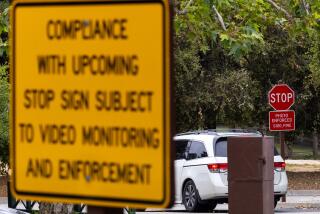How an L.A. man with cancer got a parking ticket while in the hospital and ended up losing his car
- Share via
Joseph Morrissey thought his stay in the hospital for kidney cancer surgery was going to be short.
His doctors had anticipated he’d be there about two days to recover from the minimally invasive procedure to remove a tumor and a third of his right kidney. But as he was waking up from surgery, Morrissey suffered a seizure and stroke.
He woke up three days later, unaware of what had happened. Around this same time, Morrissey received a parking ticket for his car being parked on the street outside his Highland Park home for more than 72 hours.
Morrissey wouldn’t know about the ticket until he returned home a few days later and hobbled down his driveway using a walker after his landlady mentioned she thought he’d gotten a ticket.
His plan — because he wasn’t legally allowed to drive after the seizure, and he was unsteady on his feet — was to call a friend and get his car moved as soon as possible.
Instead, the city of Los Angeles towed his car three days after Morrissey was released from the hospital and eventually sold his 1996 Jeep Grand Cherokee at a lien sale.
Last week, Morrissey filed a claim for damages against the city “for violating his due process rights after the wrongful seizure and sale of his vehicle,” according to Public Counsel, the largest pro bono law firm in the United States.
“The city tows otherwise safely parked cars after 72 hours, but then refuses to consider evidence submitted to contest citations and impound,” said Nisha Kashyap, a staff attorney at Public Counsel. “This not only disproportionally impacts low-income residents, but it’s also ableist. These practices discriminate against people like Mr. Morrissey whose medical conditions restrict their ability to move a car and are counterproductive for Angelenos already struggling to get by.”
The city has 45 days from the time Morrissey filed his government tort claim to respond.
“We’ll review the claim, and we have no further comment at this time,” said Rob Wilcox, a spokesman for the city attorney’s office.
After his car was towed, Morrissey immediately contested the ticket and tow and paid the $68 fine. Upon talking to the city about next steps, he also submitted evidence of his hospitalization and medical condition, he said.
The city acknowledged it received his records and cashed his check, according to his attorney. But then, for reasons that remain unclear, Morrissey never heard from the city about a hearing or any way to move forward with the challenge, he said. Instead, the city sold his Jeep.
Fighting a parking ticket in Los Angeles can be time-consuming and confusing. And for residents living paycheck to paycheck, when a car is towed, it can mean their car is permanently lost. As a result of all the add-on and administrative fees, the average price people must pay after a debt-collection tow is more than $1,100, according to a recent report by Public Counsel and several other law groups.
And if the car was impounded because of unpaid parking tickets or expired registration, the vehicle owner must pay the tickets or registration fees before retrieving the car, which can substantially increase the total cost, according to the report.
Morrissey moved to L.A. in 1976 and has worked for several years as a theater lighting designer.
Without his car, he has had to turn down several opportunities to work in local productions across Southern California, he said.
Last summer, he watched his grandchildren while his daughter, who lives in Santa Clarita, was at work. Without his car, he can’t offer that help and has missed out on a lot of family time.
Morrissey said there was no way he could have paid the impound and storage fees, which were about $2,000, and he remains frustrated that he followed the protocols in place and was still left carless.
“I want them to fix this, I want them to replace the car,” Morrissey said. “I felt that I was wronged, and I want justice. I want some sort of acknowledgment they made a mistake, and I want them to fix this. They have altered my life, and as simple as it was, I want my life back.”
This week, Morrissey will meet with his surgeon to find out whether he’s close to being in remission, an appointment for which he’ll need to find a ride.
More to Read
Sign up for Essential California
The most important California stories and recommendations in your inbox every morning.
You may occasionally receive promotional content from the Los Angeles Times.














